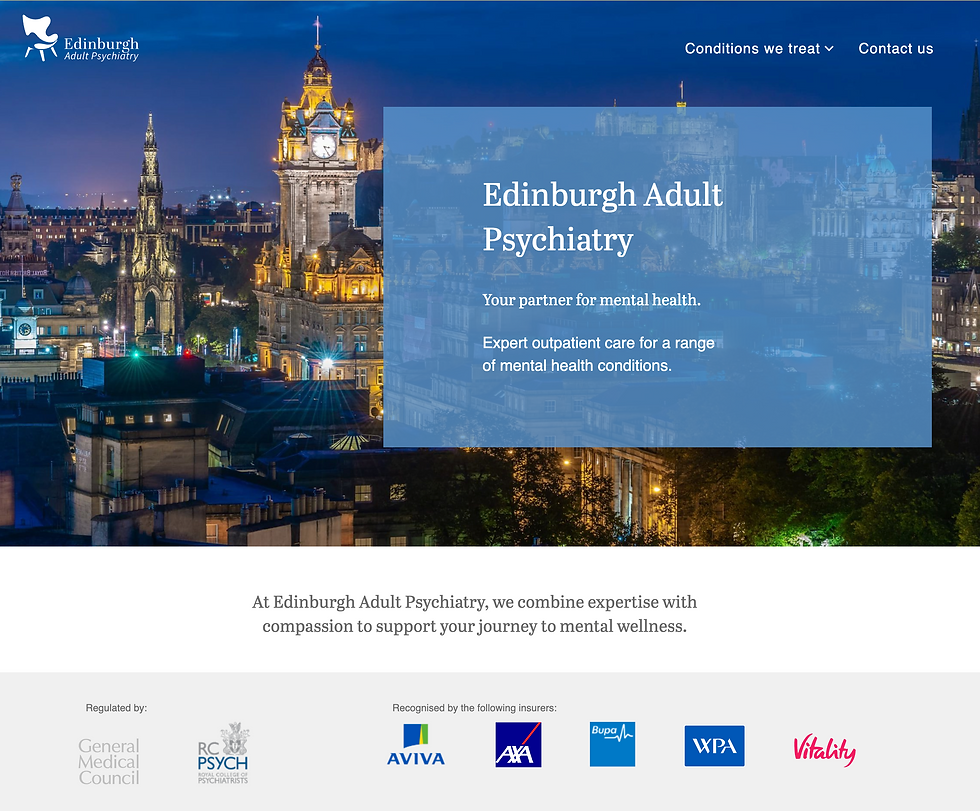Links between bipolar and ADHD
- Nov 9, 2024
- 5 min read
Updated: Nov 12, 2024

Dr. John Ferguson, Edinburgh Adult Psychiatry.
Dr Ferguson delivered a very well-received talk to our group this month. An East Lothian NHS Consultant Psychiatrist since 2009, he has a special interest in Bipolar/ADHD (and to some extent Autistic Spectrum Disorder ASD) and also has a private practice - Edinburgh Adult Psychiatry.
What is ADHD?
In short - a poorly focussing brain. It is relatively common, with a prevalence rate of around 5% in children and around 2.5% in adults (compared to around a 1-2% prevalence rate of bipolar in adults).
ADHD starts to manifest itself in childhood. There is a wide degree of severity (from mild, moderate to severe) and rather like shortsightedness in children, it is very easy to overlook.
ADHD has a high degree of heritability - around 80% of cases are thought to have a genetic component. The malfunctioning of the prefrontal cortex part of the brain, where executive functioning or executive control are thought to be centred, gives rise to a number of clinical features.
Clinical Features of ADHD.
A. Inattention and hyper-focus.
Features include a busy brain where patients describe:
"ceaseless mental activity."
"My thoughts are constantly on the go."
"Too many conversations in my mind all at once."
Sleep problems.
Mind wandering:
"I can't focus when people talk."
Difficulty concentrating enough when reading a book or watching a movie.
Hyperfocus. Those living with ADHD can get totally immersed in a task (like playing a video game, or doing a creative project). People with the condition frequently lose track of time. It is not unknown for those hyperfocussed on something to forget to go to the loo, or are frequently late for (or entirely miss) appointments.
B. Executive Functioning.
Those with ADHD are often said to be "time blind.":
"time slips through my fingers."
"I've no sense of time."
They may be late for a dinner engagement, or are often seen rushing to get somewhere as they left late etc.

There are frequently productivity issues for those with ADHD, especially around difficulties getting started on a task. Dr. Ferguson likened it to those with the condition needing to get up and going on a Penny Farthing bicycle, whereas those with normal function easily get on and off a step-through bike.
It seems like those with ADHD need a sense of urgency to get started. If someone has three months to complete a thesis or dissertation, they will often leave it until the last week to begin. Also having someone present to exert external pressure may be beneficial for the person with ADHD to respond. A boss breathing down one's neck or a superior officer shouting at someone with ADHD brings much-needed discipline to bear.
(as an aside: it is believed that a contributing factor as to why so many adults with undiagnosed ADHD have, since Covid, been applying to be assessed, may be related to difficulties when working at home. When working in an office, those with ADHD functioned okay as they had bosses or colleagues applying external pressure on them. However in the work-from-home environment, many with ADHD have experienced a collapse in work effectiveness without someone supervising them and keeping them on-task.)
If starting a task is difficult with ADHD, so is finishing one. Someone who moves into a new flat and is still surrounded by boxes six months later or has the walls of their flat prepped ready for painting and things haven't moved on a year later might be symptomatic of them having the condition.
Disorganisation. Those with ADHD may struggle here: bills not paid on time, insurance renewals missed, forgetting things: "where did I leave my keys?", phone left in the toilets somewhere etc. Planning (such as a holiday) left too late when flights have booked up, difficulty filling in forms etc. All are symptoms of difficulties with organisation.
C. Impulsivity and Hyperactivity.
Fidgetiness:

Those with ADHD often display signs of being fidgets. Toying with their rings, finger tapping, bouncing their leg, twirling their hair or pen clicking and twirling. Pulling hair from eyebrows or beard. Picking their skin or lips. All these signs can be indicative of a mind with ADHD.
Impatience:
Finding it intolerable to be waiting in a queue, getting overly-frustrated being stuck in traffic, walking very fast, talking quickly or driving at inappropriate speeds. Signs, too, of possible ADHD.
Impulse Control:

Features of difficulty with impulse control include: Rash spending, ill-considered decisions (such as getting a tattoo that's later regretted, getting into relationships/ having sex without much consideration, ending relationships, quitting jobs, binge eating or drinking or self-harming.
D. Emotional Regulation
Emotional Volatility
Those with ADHD can easily become frustrated, irritated, angry or overwhelmed, easily excited, suddenly sad.
Rejection Sensitive Dysphoria

Rejection or response to criticism both seem to affect those with ADHD more deeply than people without. Rejection or criticism feel bad for everyone, but somehow the negative feelings are often felt more acutely by those with ADHD.
The Consequences of ADHD.
Academic failure is common, difficulty launching into adulthood too. Behaviours stemming from ADHD can have a negative impact on self-esteem. "Why can't I just do this, like everyone else?"
Career failures, self-destructive behaviours (smoking, alcohol or drugs) or hanging-out with the wrong crowd are common.
Those women with ADHD have their first child at an earlier age and are more likely to have multiple children.
30% of young prisoners in Scotland have an ADHD diagnosis.
Those with ADHD have increased rates of obesity, are more likely to suffer from problem gambling, performance issues at work and have stress in their relationships.
Life with ADHD can feel like you are always swimming against the current and you are more likely to suffer burn-out.
There are higher incidences of other mental health problems for those with ADHD, as we shall see next...
ADHD and Bipolar
Comorbidity
Only around 30% of people with ADHD have it as a single condition with nothing else diagnosed.
The co-incidence of ADHD with other conditions (called comorbidity) is shown in the table below:

So, approximately 21.2% of those of us with bipolar also have an ADHD diagnosis and conversely, 19.4% of people with ADHD also have bipolar.
Misdiagnosis and missed diagnoses.
Some of the signs and symptoms of bipolar and ADHD can be very similar and it can be the case that often a psychiatrist may have a special interest in, say, mood disorders (such as bipolar), but have limited experience of ADHD and vice-versa. It often takes a psychiatrist who has experience and knowledge of both to spot the subtle differences.
Missed diagnoses are common. It is very easy for a physician to quickly zero-in on a diagnosis where the features of one illness are very apparent (such as hypomania) but miss the subtle signs that something else might be going on in the background.
This has of course a significant impact on the effectiveness of treatments, as bipolar and ADHD respond very differently to differing medications.
Treatments
ADHD generally responds well to medication. Although the number of drugs that are prescribed for ADHD might be limited in number, they are often very effective as treatments:
Methylphenidate (brand names: Ritalin, Concerta, Delmosart, Equasym, Medikinet).
lisdexamfetamine (Elvanse)
dexamfetamine (Amfexa)
atomoxetine (Strattera)
guanfacine (Tenex (immediate-release) and Intuniv (extended-release) )
These are generally stimulants.
For someone who also has bipolar, the order in which treatment is carried out can be really important.
Whereas whether you put the milk in your teacup first or after you pour the tea doesn't really matter, it absolutely does for someone receiving treatment for both bipolar and ADHD.
Strong stimulants such as Ritalin can induce mania in someone with bipolar unless that person's mood has been stabilised by medication first.
We had a very active Q&A session after the presentation and thanked Dr. Ferguson for coming along.
Dr. Ferguson supplied us with some self-report questionnaires which you and/or a family member can fill-in prior to seeing your medical professional:
Should you wish to consult privately with Edinburgh Adult Psychiatry about bipolar, ADHD or both, you can reach them at:

